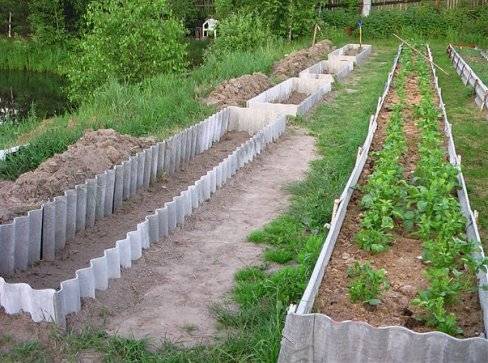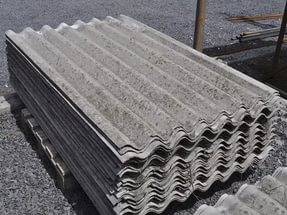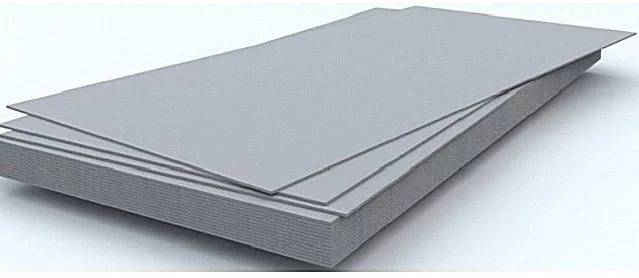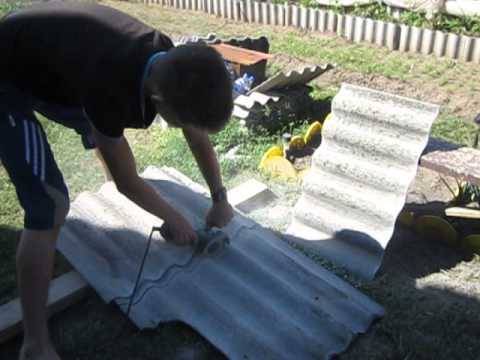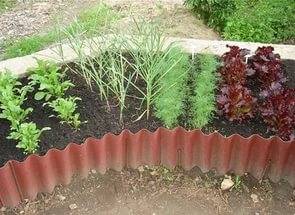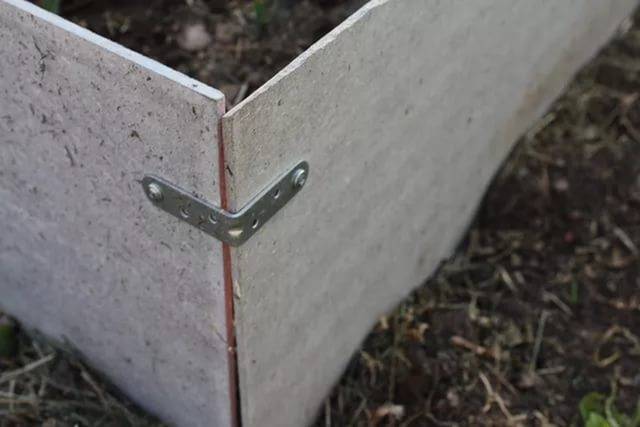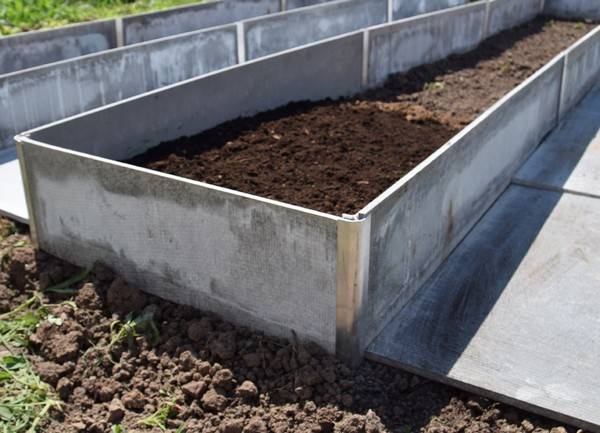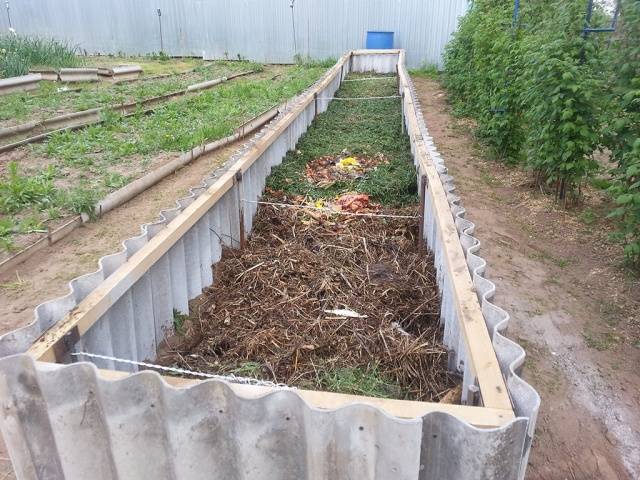Content
Fencing garden beds all the materials at hand. Most of all, the owners of the suburban area like slate. Inexpensive material allows you to quickly build the sides, and the design is smooth and neat. Every person can make slate beds with their own hands, you just need to have patience and a tool.
Features of asbestos-cement material
Before you start making slate beds, you need to familiarize yourself with the characteristics of this material. The sheets can be used to make beds in the greenhouse and in the garden. Asbestos cement can withstand any environmental conditions except exposure to high temperatures. But hardly anyone will kindle a fire directly at the very side of the garden.
Most often, wavy slate is found in a summer resident's storehouse. This could be an old roof covering from a house or shed. For fencing, this material is better suited than flat sheets. Asbestos-cement slate is a fragile material, and the waves form a kind of stiffening ribs. It is important to install it correctly here. If such a slate is chosen for the garden bed, then it is better to cut it into strips across the wave. The fragments will be shorter than from the sheet, loose in length, but much stronger.
Ideally flat sides will be obtained if you use flat slate for the beds of the summer cottage. However, one must be prepared for the fact that such walls will turn out to be rather fragile. It is optimal to reinforce the perimeter of the side with wooden or metal stakes driven into the ground. It is better to fasten the corners of the fences with metal corners and bolts. The joints of flat sections can be connected with a metal strip and the same bolts.
Slate as a material for garden fencing has its advantages:
- rather not heavy material allows you to quickly build sides;
- slate is resistant to fire, temperature extremes and dampness;
- does not corrode and rot;
- service life is not less than 10 years;
- the sheet is easy to process;
- finished fences acquire aesthetic appeal.
The big disadvantage is the fragility of the material. Sheets are afraid of impacts and heavy loads. Asbestos cement is not afraid of fire, but from prolonged exposure it overheats and bursts into small pieces.
Deeply dug fences do not let ground pests inside the garden bed, and also prevent the penetration of creeping roots weeds... However, thin sheets have the property of being rapidly heated in the sun. From this, moisture quickly evaporates from the garden, which forces the gardener to water more often.
There is an opinion that slate buried in the ground is harmful to growing plants. Indeed, it is so. The asbestos contained in the material will release toxic substances that contaminate the soil during decomposition.
This problem can be solved if the country beds are fenced off with slate painted from the factory. As a last resort, the sheets can be painted on their own with acrylic paint or liquid plastic.
Safe working with slate
Working with each type of building material has its own characteristics. Asbestos-cement sheet is easy to process, but hazardous to human health.Cutting sheets into strips for edging the beds will have to be done with a grinder. Large amounts of dust containing small particles of asbestos enter the respiratory tract and eyes of a person, which can cause serious illness. When cutting slate, be sure to use a respirator and goggles. It is advisable to pay attention to the direction of the wind so that the dust is carried away to the side.
After cutting all strips, the asbestos-cement dust must be disposed of. Otherwise, the wind will blow it around the yard of the dacha, plus the soil will be contaminated where the cutting took place.
Making a high bed from flat and corrugated slate
So, let's take a closer look at how high beds from slate at their summer cottage. You can use corrugated and flat sheets, and we will start to consider the manufacturing process with the first type of slate.
So, there are corrugated sheets from which you need to make a fence:
- We start work by marking stripes across the waves. It is more convenient to draw the cut lines on slate with chalk. The height of the strip is determined by the purpose of the bed. Usually, it is enough for the board to protrude from 15 to 30 cm above the ground. When using the "warm bed" technology, the height of the board is increased to 50 cm. Approximately the same launch should be left in the ground so that the sides are stable.
- Along the marked lines, strips are cut for slate beds with a grinder. First, cuts are made at the edges of the sheet so that the corners do not break off. Next, the main blade is cut along the markings.
- The finished strips are dug in vertically along the perimeter of the future bed. The soil on both sides of the board is well compacted. For reliability, each piece of the strip is reinforced with a peg driven into the ground.
At this, the wavy slate fence is ready, you can fall asleep inside the ground.
The beds are made of flat slate using a similar system. The same markings are applied, cutting is performed with a grinder, but the process of joining the sheets is different. If the corrugated slate is simply dug into the ground, then the sheets of flat asbestos-cement material are additionally reinforced with metal joints. The photo shows how two sheets of flat slate are connected using a metal corner. The joints of straight sections are connected using overhead metal strips. All connections are bolted together and then painted to protect against corrosion. Further work is the same as in the version with wavy slate.
Features of arranging a high bed
So, the slate fences are ready, it's time to make the garden itself:
- First, a fertile layer of soil is selected from the inside along with the grass, but they are not thrown away, but put aside. The bottom is rammed and lightly watered with water.
- The next layer is laid from wood waste. These can be small branches, wood shavings, etc.
- A layer of waste of any vegetation is poured on top. All this is sprinkled with peat, and the previously removed fertile soil with grass is laid on top.
When laying the contents of a high bed, it is advisable to water each layer with water. Moisture will accelerate the process of decomposition of organic matter.
When building high beds, it's time to remember the fragility of slate. A large mass of soil can crush fences. If the board height exceeds 40 cm, the opposite strips are pulled together with galvanized wire. How this is done is shown in the photo. If the supporting pegs are installed only on the outside of the fence, then you will have to drill holes in the slate and pull the wire through them.
Inside a high bed, fenced with slate, the soil temperature is 4-5aboutMore than in the garden. This allows you to grow early vegetables and root crops. Sometimes gardeners additionally put wire arcs and stretch the film. It turns out to be an excellent greenhouse with fertile soil.
The video shows slate beds:
Arrangement of aisles
If there are a lot of high beds in the summer cottage, it is important to take care of the aisle. In addition to the aesthetic appearance of the site, the aisles additionally strengthen the fence. First of all, the soil between adjacent beds is well rammed. Further registration depends on the capabilities of the owner. Paths are made of concrete, laid out with paving slabs, etc.
Here, in principle, are all the secrets regarding the question of how to make slate beds in your summer cottage. The work, as you can see, is not complicated, but the benefits will be seen in the amount of the harvested crop.
